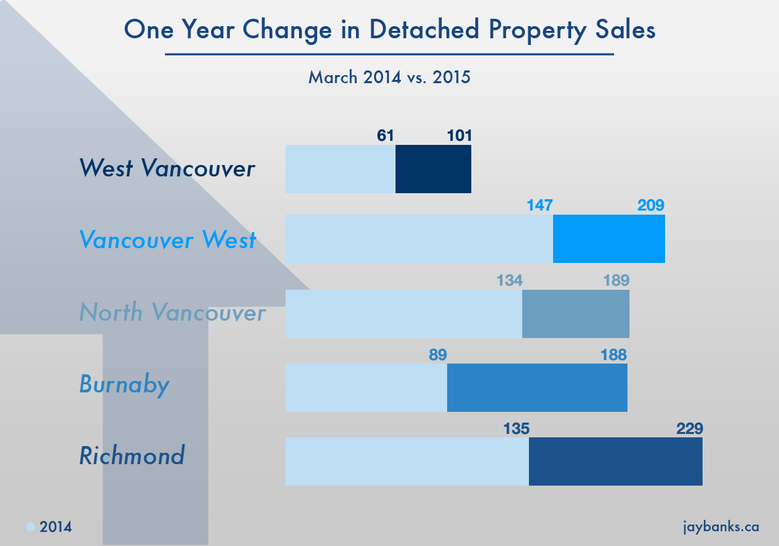March certainly blew into the real estate market like a lion and exploded recent sales and price records in Vancouver and Toronto. Sales in Vancouver were up 26.8% above the ten year sales average for the month.
Prices rose in every category but demand was noticeably strong for detached properties. The benchmark detached sale price of $1,052,800 for Metro Vancouver was up 11.2% over March 2014. Vancouver Westside detached properties were up 12.3% to a benchmark price of $2,447,700 in the same period.
 Here on Earth by David Welsh
Here on Earth by David Welsh
Vancouver Westside is particularly attractive to offshore investors and to well-established local buyers. The next generation of buyers many of whom have family financial assistance are pushing up prices in the Eastside of Vancouver. The detached benchmark price there is $1,015,200 and rising with multiple offers on most properties. This has resulted in a 14.5% price increase since March 2014.
Vancouver attracts buyers for many reasons and one is the density rezoning policies enacted at City Hall. Homeowners can mitigate some of their costs by increasing the number of residences on the lot. Most neighbourhoods have lanes behind the detached properties. This allows the building of a laneway home for family or rental income. Secondary suites inside the main home are also allowed. These additional residences cannot be severed so there is still only one title for 3 possible homes on the lot.
Many destination cities around the world are struggling with the same problems as Vancouver - an influx of international buyers, rising prices and fewer opportunities for local potential home owners. In 2013 there was a delegation of planners and Councillors visiting Canada from Melbourne Australia. They were looking at ideas for increasing density without spoiling their city.
It was reported that they didn't care for the Metro Toronto solution of infinite numbers of highrise condos and urban sprawl. Melbourne is more analogous to Vancouver with its finite amount of developable land. They were attracted to 'soft' density policies where more was allowed on one lot. For both cities it still doesn't solve the problem of where to house the huge projected population increase over the next few years.
Commuting is less and less attractive to the young professional generation now establishing homes and families in condos in downtown Vancouver. It's becoming more like big cities everywhere. People are living in less space inside and participating in life outside the home. Downtown elementary schools are full and parents are enrolling children in Westside schools as Vancouver has open boundaries. Parents are not guaranteed a placement in their school catchment area so they are adapting by choosing a high performing school and arranging for transportation of their children.
 Detached Property Sales in March
Detached Property Sales in March
This has created a headache for the Vancouver School Board who is being pressured by the provincial government to close schools with low enrollments. Many of these schools are anchors to their Eastside neighbourhoods offering community programs and serving families who cannot afford to shuttle their children across town to school.
Most condo developers today are building their largest projects along the transit lines and creating hubs of homes and facilities at major intersections. At this time ballots have been sent out to residents in Vancouver and suburbs to vote on a transit referendum to agree to an increase in local sales tax in order to expand and support the existing transit system and infrastructure so the present and future populations will be able to get out of their cars to travel. It's a chicken or the egg dilemma and there seems to be resistance to the idea of minimally increasing the sales tax for transit solutions yet there are chronic complaints about bridge and highway gridlock throughout the Lower Mainland. Results will be announced after May 29 2015.
Continuing sales and rising prices are to a great degree dependent on the historic low mortgage interest rates of the past few years. According to the Bank of Canada these will continue because of low inflation and the effect on the Canadian economy of the precipitous drop in world oil prices.
JB00DT

